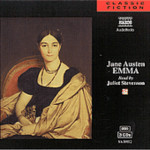
Emma (abridged) (Read by Juliet Stevenson)
 $41.00
Out of Stock
$41.00
Out of Stock6+ weeks add to cart
Emma (abridged) (Read by Juliet Stevenson)
JANE AUSTEN
[ Naxos Audio Books / 3 CD Box Set ]
Release Date: Thursday 1 March 2007
This item is currently out of stock. It may take 6 or more weeks to obtain from when you place your order as this is a specialist product.
Jane Austen was born in Hampshire in 1775, the seventh of eight children. Her father was a clergyman who ensured that his children were well educated.
Winner of the Naird Award 1995 for children's storytelling.
Includes music by Beethoven, Cramer and Purvis.
Jane Austen was born in Hampshire in 1775, the seventh of eight children. Her father was a clergyman who ensured that his children were well educated. After a brief spell at boarding school when they were very young, Jane and her sister Cassandra were educated at home. In 1801, Mr. Austen retired and the family moved to Bath. Although Jane Austen never married, she is reputed to have had a romance in 1802, but she parted from her lover, who died the following year. In 1803, she was proposed to by a wealthy Hampshire landowner and after initially accepting his proposal; she refused him the following morning. In 1805, her father died, and she moved with her mother to Southampton and in 1809 to the village of Chawton.
In 1816, Jane Austen became seriously ill, and was taken to Winchester in search of a cure. She died there in 1817. She is remembered by six great novels: Sense and Sensibility (1811), Pride and Prejudice (1813), Mansfield Park (1814), Emma (1816), Northanger Abbey (1818) and Persuasion (1818) - all available on Naxos AudioBooks.
Emma was written and published in less than two years, while Jane Austen was living at Chawton in Hampshire. Although it lacks the narrative scope of her other novels, many have hailed it as one of her most perfect and accomplished works in that she concentrates predominantly on the examination of a small society in the grip of a complex pattern of social and moral values.
The character of Emma was a brave intention. Indeed Jane Austen wrote: "I am going to take a heroine whom no one but myself will much like." Thus, at the beginning of the book we meet a wealthy, over-indulged young woman, who feels she has every right to trifle with the destiny of others simply as a result of the social position she occupies. She is therefore only subscribing to the accepted social hierarchy when she explains to Harriet Smith that were she to have married the humble Robert Martin, she could not possibly have visited them, given her elevated social position. This is a social value, which contemporary readers would have recognized, but Jane Austen leaves us in no doubt as to what she feels is the morality of such a statement. Thus, throughout the novel, characters reveal themselves not only according to the position they occupy in society, but also in terms of the way they behave towards one another. The Coles are an upwardly mobile family whom Emma at first despises for their presumption, but their generosity of spirit is contrasted with her small-minded arrogance.
For Jane Austen, a happy marriage was the symbol of social and moral adjustment and harmony, and it is not until Emma repents of her lack of sensitivity to others and her reckless interference in their lives, that she herself can become eligible. It is then that she discovers that she is in love, and by marrying the morally virtuous Mr. Knightley equilibrium and harmony are restored.

